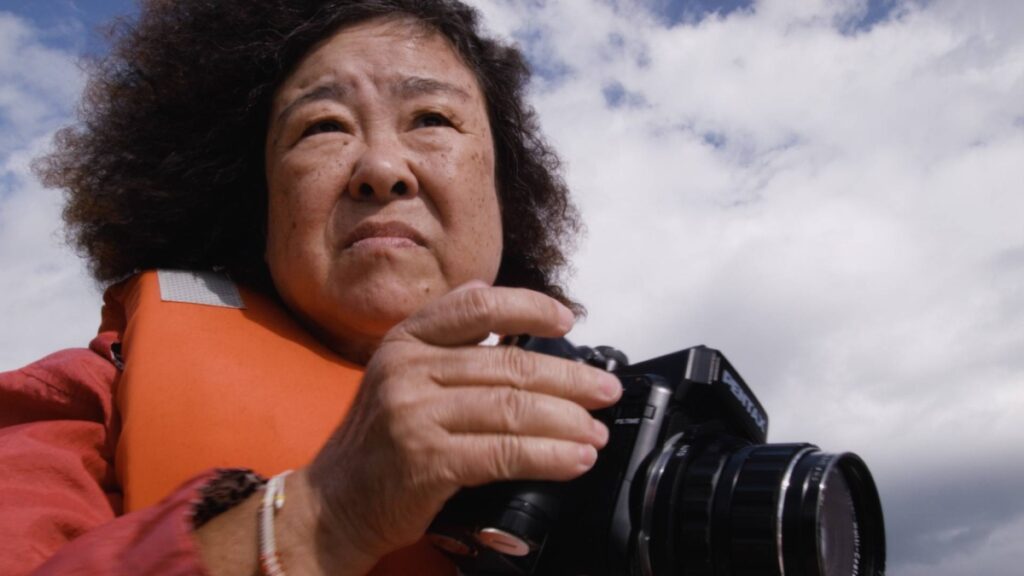The standard procedure for making a documentary about a living person is to interview those who know the subject as a friend, enemy or somewhere in between to get a multifaceted and objective portrait. And if the film is critical rather than adulatory, the subject may never sit down for a Q&A.
United States-based filmmaker Hiroshi Sunairi tosses this formula in “From Okinawa with Love,” his revealing documentary about the early career and present-day life of Okinawan photographer Mao Ishikawa.
Taking a fly-on-the-wall approach, he follows Ishikawa as she walks around rundown neighborhoods searching for places where she worked as a bar girl in the mid-1970s, all of which catered to African American servicemen. Later, we see her as she showers and talks about her bouts with cancer and their lingering effects, a very visible colostomy bag among them.
All this could have become a grim, even exploitative look at one elderly woman’s hardscrabble youth and physical decline, but Sunairi’s subject is both a talented artist and an indomitable true original who talks about her experiences, from love affairs to health struggles, with frankness and no regrets.
Born into a middle-class Okinawan family, Ishikawa went to Tokyo at age 19 to study with renowned photographer Shomei Tomatsu (though she hardly ever attended classes). Her choice of career, she tells Sunairi, came from her immersion as a teenager in the turbulent protests against American military bases that preceded and accompanied the reversion of Okinawa from the U.S. to Japanese control in 1972. She describes her shock at seeing a riot policeman die on the street and says she made it her mission to photograph Okinawans and subjects related to Okinawa.
Instead of an activist fighting for a cause, however, she became a bar girl with the aim of capturing the women who catered to the desires of Black soldiers, some of whom ended up marrying them. She also fully participated in their lives as a friend and, in a series of long-term relationships, lover. And always, everywhere, she carried her 35 mm camera.
The result was three photo books, beginning with 1982’s “Hot Days in Camp Hansen,” which made her reputation. The collections also stirred up controversy for their subject matter — mainly Okinawan bar girls and their Black American boyfriends in casual, entwined poses — and for their unfiltered, nonjudgmental point of view.
Ishikawa says she was criticized as a “prostitute photographing prostitutes,” but she never buckled or wavered. “Those women were admirable,” she tells Sunairi. “We were free spirits.”
She later won praise and accolades, but her fundamental stance — anger at what the U.S. military has done in Okinawa and elsewhere, but love for American soldiers as individuals — still draws ire: both from of Japan’s conservative xenophobes, who view the soldiers with fear and the bar girls with contempt, and from progressives who see Ishikawa’s apolitical “everybody’s beautiful” attitude, and the film’s depiction of it, as problematic.
When he presented “From Okinawa with Love” at the Foreign Correspondents’ Club of Japan, Suinari said that a group of female documentary filmmakers had become upset with his explanation of the film at a workshop in Brooklyn. “They said, ‘How dare you represent the bodies of Black men,’” he commented. “People are so nervous now about how to speak on such issues,” he added.
By stark contrast, Ishikawa speaks what she feels and lives what she speaks. As she tells Sunairi in the unclothed shower scene — by far the film’s rawest and most powerful — “I’ve photographed people’s most intimate moments, so I should be photographed that way myself.”
What a force of nature and what a vivifying, mind-expanding film. “From Okinawa with Love” delivers Ishikawa’s personality and message up close and in the round. Talking heads need not apply.
| Rating | |
|---|---|
| Run Time | 101 mins. |
| Language | Japanese |
| Opens | Aug. 31 |



